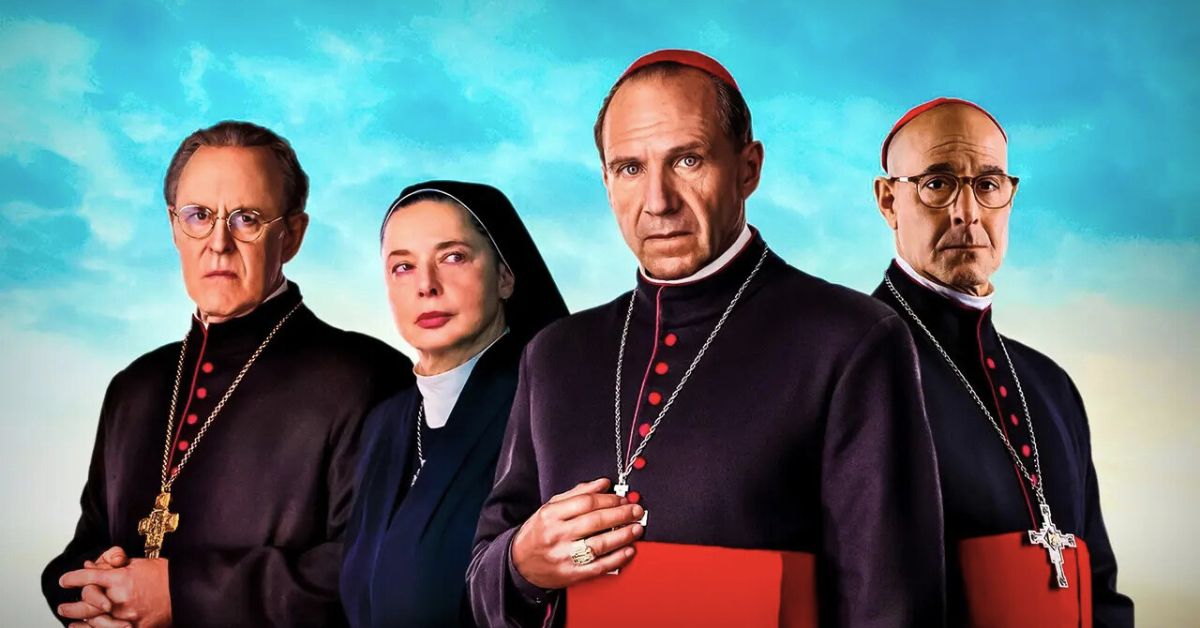By: Michael Walsh
In 2016, author Robert Harris published the novel Conclave, detailing a fictional papal election following the unexpected death of the Pope and the ambiguous and ambitious players who emerge and vie for the holy throne.
Then, in 2022, hot off his BAFTA Best Picture-winning film, All Quiet on the Western Front, German director Edward Berger set his sights on adapting the titular novel. The result is a meticulously crafted political thriller full of intrigue and introspection with stunning visuals and powerful performances.
The film follows Cardinal Thomas Lawrence (Ralph Fiennes), the Dean of the House of Cardinals, who is tasked with running the covert, centuries-old process of electing a new pope upon the late Holy Father’s death. Soon, the Catholic Church’s most powerful leaders have begun to gather from around the world, including hopeful candidates angling to become the next leader of the Vatican. Amongst them, progressive Secretary of State and former Archbishop of Milan Cardinal Bellini (Stanley Tucci), conservative Patriarch of Venice Cardinal Tedesco (Sergio Castellitto), moderate Camerlengo (Treasurer), Prefect of the Congregation for the Evangelization of Peoples, and Archbishop Emeritus of Quebec Cardinal Tremblay (John Lithgow), traditionalist Cardinal Major Penitentiary, and former Archbishop of Lagos Cardinal Adeyami (Lucian Msamati) and the newly arrived mysterious Cardinal Benitez (Carlos Diehz).
The group learn that Cardinal Benitez has been made Archbishop of Kabul in pectore (meaning in secret) by the late Pope to protect him from terrorist targeting. However, once sequestered together within the Vatican, Lawrence begins to find himself at the centre of numerous conspiracies and secrets that could shake the very foundation of the Church.
In many ways, the film is a surprisingly nuanced reflection of the Catholic Church – conservative yet progressive, Eurocentric yet global, full of deep tradition and yet also containing innovation – which means it has something to appease each faction and something to offend – resulting in a carefully woven tapestry of controversy and contemporary Catholic culture that is sure to provoke plenty of conversation.
‘Provocative Yet Pastoral’
As a claustrophobic thriller, the film is both provocative yet pastoral and narrowly skirts around becoming melodramatic by focusing on the sensitive yet stern Cardinal Lawrence, played beautifully by Ralph Fiennes, as he shepherds the politically ambitious and ambiguous papal election as he seeks to protect the sheep from the wolves that surround and navigate conclave-shaking revelations amidst his own faltering faith.
For every homily that reveals deep pastoral truth, there are constant reminders of sinful, fallen, broken, petty, prideful people and revelations ranging from infidelity to intersex conditions to electoral fraud.
The screenplay, adapted from the 2016 novel, is pulpy and revels in red herrings and carefully constructed catalysts that thrill and enthral. The ensemble all rise to the occasion in this strikingly relevant chamber piece vicariously simmering within the walls of the Vatican – with an applause garnering moment for Isabella Rossellini and intense work from Tucci, Lithgow and newcomer Carlos Diehz. Add Oscar winner Volker Bertelmann’s succinct score, and the precise editing, direction, cinematography and art direction all further elevate the film’s already politically tense and thrilling atmosphere to deliver one of 2024’s best films, albeit one that will not be immune from controversy.
Reel Dialogue: The Good Shepherd
Despite wanting to resign as the Dean of the College of Cardinals to retire to the order outside of Rome, Thomas Lawrence was told by the Pope that he was a “manager,” not a “shepherd.” This comment rings in Lawrence’s mind as he states, “You’re a manager—so manage them.”
However, whilst Lawrence does indeed manage the conclave, it becomes more evident and more apparent that he does have a pastor’s heart – a deep desire to shepherd the sheep and protect them from the wolves that surround them and have infiltrated their ranks in sheep’s clothing.
As Lawrence counsels the conclave, he shares: “There is one sin which I have come to fear above all others, certainty. There would be no mystery if there was only certainty and no doubt. And therefore, no need for faith.” He goes on to pray that they would choose a pope who doubts and is willing to be transparent about their flaws, confess them, and serve humbly.
All leaders in the church should be aware of their weaknesses but seek to lead as able. But Christ, the great shepherd, had no flaws, but saves us from ours.
“We all, like sheep, have gone astray, each of us has turned to our own way; and the Lord has laid on Him the iniquity of us all.” Ezekiel 34:12
“As a shepherd looks after his scattered flock when he is with them, so will I look after my sheep. I will rescue them from all the places where they were scattered on a day of clouds and darkness.” – Isaiah 53:6
Article supplied with thanks to City Bible Forum.
All images: Movie publicity
About the author: Michael Walsh is a Missions Engagement Minister in Sydney, and an avid film fan. His love of film is surpassed only by his love of God, and his desire to make the Gospel known.

